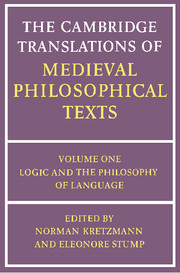Book contents
- Frontmatter
- Contents
- Preface
- General Introduction
- 1 BOETHIUS: On Division
- 2 Anonymous: Abbreviatio Montana
- 3 PETER OF SPAIN Predicables Categories
- 4 LAMBERT OF AUXERRE: Properties of Terms
- 5 Anonymous: Syncategoremata Monacensia
- 6 NICHOLAS OF PARIS: Syncategoremata (selections)
- 7 PETER OF SPAIN: Syllogisms; Topics; Fallacies (selections)
- 8 ROBERT KILWARDBY: The Nature of Logic; Dialectic and Demonstration
- 9 WALTER BURLEY: Consequences
- 10 WILLIAM OCKHAM: Modal Consequences
- 11 ALBERT OF SAXONY: Insolubles
- 12 WALTER BURLEY: Obligations (selections)
- 13 WILLIAM HEYTESBURY: The Compounded and Divided Senses
- 14 WILLIAM HEYTESBURY: The Verbs ‘Know’ and ‘Doubt’
- 15 BOETHIUS OF DACIA: The Sophisma ‘Every Man is of Necessity an Animal’
- Index
4 - LAMBERT OF AUXERRE: Properties of Terms
Published online by Cambridge University Press: 05 June 2012
- Frontmatter
- Contents
- Preface
- General Introduction
- 1 BOETHIUS: On Division
- 2 Anonymous: Abbreviatio Montana
- 3 PETER OF SPAIN Predicables Categories
- 4 LAMBERT OF AUXERRE: Properties of Terms
- 5 Anonymous: Syncategoremata Monacensia
- 6 NICHOLAS OF PARIS: Syncategoremata (selections)
- 7 PETER OF SPAIN: Syllogisms; Topics; Fallacies (selections)
- 8 ROBERT KILWARDBY: The Nature of Logic; Dialectic and Demonstration
- 9 WALTER BURLEY: Consequences
- 10 WILLIAM OCKHAM: Modal Consequences
- 11 ALBERT OF SAXONY: Insolubles
- 12 WALTER BURLEY: Obligations (selections)
- 13 WILLIAM HEYTESBURY: The Compounded and Divided Senses
- 14 WILLIAM HEYTESBURY: The Verbs ‘Know’ and ‘Doubt’
- 15 BOETHIUS OF DACIA: The Sophisma ‘Every Man is of Necessity an Animal’
- Index
Summary
Introduction
Not much is known about the life of Lambert of Auxerre except that he was a Dominican in the Dominican house at Auxerre around the middle of the thirteenth century, and that he wrote a logic text known as Summa Lamberti or just Logica. Lambert is usually grouped with the other, mostly older, terminist logicians of this period – Peter of Spain, William of Sherwood, and Roger Bacon. All wrote roughly similar logic texts. The section translated here is taken from the last chapter of Lambert's Logica.
Medieval logicians took a word's natural property to be signification, which they understood as a word's presentation of a universal nature to the mind. But a word acquires other properties by being used in various ways in propositions. These other properties include supposition, appellation, copulation, ampliation, and restriction. Supposition is by far the most important of these properties, roughly analogous to reference in twentieth-century terminology. Medieval logicians divided supposition into several subcategories; personal supposition, for example, is a property a term has when it is used to refer to individuals of which it is truly predicable, and simple supposition is the use of a term to refer to the associated universal. Appellation is a property of terms similar to supposition, except that a term appellates only those things that actually exist at the time of utterance and of which the term is truly predicated.
- Type
- Chapter
- Information
- The Cambridge Translations of Medieval Philosophical Texts , pp. 102 - 162Publisher: Cambridge University PressPrint publication year: 1989
- 1
- Cited by



